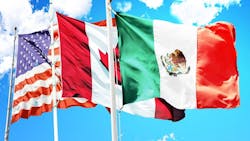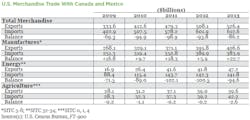NAFTA Still Boon to Manufacturing 50 Years Later
North American free trade has proven to be a resounding success for U.S. manufacturing, according to a new report from the Manufacturers Alliance for Productivity and Innovation (MAPI), NAFTA: A 50-Year Success Story for U.S. Manufacturing.
Economic integration among the three democracies based on private sector–driven free trade and market-based currencies has had substantial benefits for U.S. manufacturing, according to Ernie Preeg, senior advisor, MAPI
Preeg lists a number of key statistics as examples:
- U.S.-NAFTA exports of manufactures grew by 52% from 2009 to 2013 compared with 34% to the rest of the world, raising NAFTA exports to 35% of global exports;
- U.S. manufactured exports to Canada and Mexico of $407 billion in 2013 were more than five times as large as the $76 billion of exports to China;
- Seventy-seven percent of U.S.-NAFTA merchandise exports in 2013 were manufactures and almost half of services exports were business services deeply integrated with the manufacturing sector;
- The $23 billion NAFTA surplus in manufactures in 2013 stands in dramatic contrast with the $524 billion deficit with the rest of the world, including $351 billion with China; and
- U.S.-NAFTA exports of business services, while only one-tenth of manufactures, were more than double imports.
"The hallmark has been bold and forward-looking leadership by all three governments in the face of protectionist opposition and vested interest, " Preeg said. "The NAFTA relationship is of growing importance for U.S. trade and investment."
Preeg also describes three decisive and overlapping challenges that lie ahead: reform in Mexico to more competitive and productive private investment, including the end of the Pemex state oil monopoly; a North American energy strategy to become a large net exporter of fossil fuels; and an active NAFTA role for restoring the multilateral trade and financial systems, which Preeg argues have deteriorated greatly since 2000.
“NAFTA has been an extraordinary success story,” Preeg concludes. “Work remains, however, to consolidate and improve the North American free trade relationship, and the three nations can and should act together to pursue their global economic interests.”

